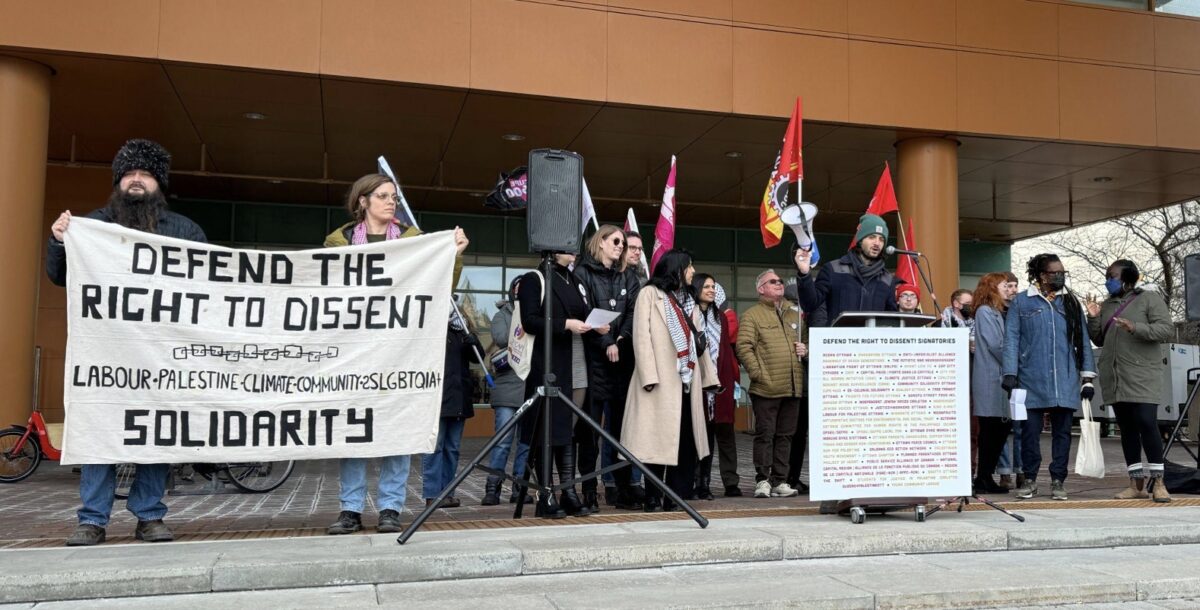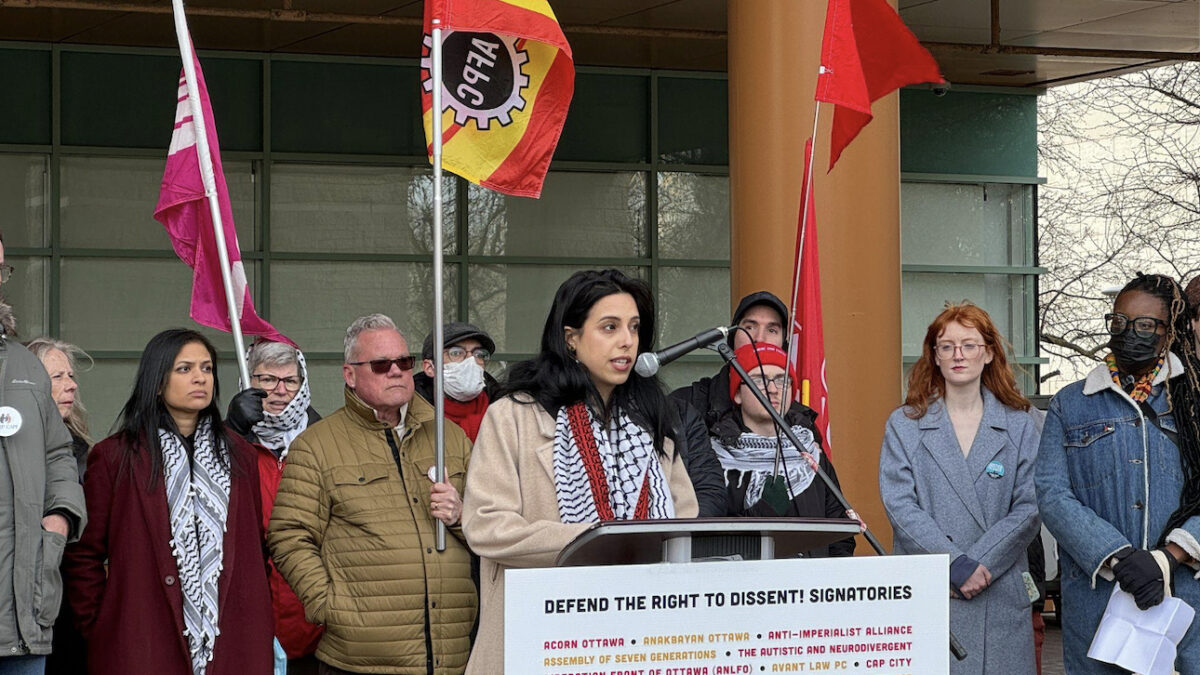Let people be loud when they protest.
That is what representatives of a coalition of dozens of advocacy organizations, unions and other groups are demanding.
During a rally in front of Ottawa city hall, speakers from the Defend the Right to Dissent Coalition urged the city to amend Bylaw 2017-255, which limits the use of noise amplification devices, such as megaphones, in public.
Horizon Ottawa says nearly 50 tickets and about $23,000 in noise-violation fines have been issued by bylaw officers in the past three months. Fines can range from $400 to $10,000 for the bylaw that aims to “preserve, protect and promote public health, safety, welfare and peace and quiet of the inhabitants of the City.”
Speakers at the rally said the bylaw infringes the right to protest because demonstrating, rallying and striking have traditionally relied on megaphones to initiate chants and give directions to protesters.
The coalition wants an amendment to exempt protesters and picketers from the bylaw, which states: “No person shall operate or use or cause to be operated or used any sound reproduction device on any highway or other public place.”
They are also asking city council to recommend the waiving of the $23,000 in fines.
“This is something that affects everyone,” said Sam Hersh, coordinator of the grassroots municipal watchdog group Horizon Ottawa.
Hersh said that the majority of the fines were issued to pro-Palestine protesters rallying in recent months against the Israeli military’s attacks targeting Hamas extremists in Gaza but resulting in massive civilian casualties.
The use of this bylaw against protesters sets a dangerous precedent to the pillars of our democracy.
Sarah Abdul-Karim, member, Palestinian Youth Movement
The Israeli assault on Gaza has killed more than 33,000 Palestinians as of early April, including 14,000 children and 9,000 women, according to the Palestinian health authority. The assault was triggered by an Oct. 7 Hamas attack that killed about 1,200 people in Israel and saw more than 250 others taken hostage, according to Israeli officials.
Sarah Abdul-Karim, a member of the Palestinian Youth Movement, says the city bylaw is “abusive”.
Abdul-Karim said that after recent rallies calling for a ceasefire in the Israel-Hamas conflict, bylaw officers have been showing up at the homes of rally-goers to ticket them in an attempt to “intimidate and silence our community. … The use of this bylaw against protesters sets a dangerous precedent to the pillars of our democracy.”
The bylaw has even hit protesting politicians. Ottawa-Centre NDP MPP Joel Harden was fined $490 fine for using a megaphone during a pro-Palestine rally on Dec. 30.
“I’m here to defend our right to dissent loudly in the city,” said Callie Metler, executive director of Capital Pride, a 2SLGBTQ+ advocacy group in Ottawa, on Tuesday.
For Metler, limits on protests should involve safeguarding public safety. In her case, the key issue prompting her to engage in protest has been the defence of the rights of trans youth. A recent Ottawa demonstration defending trans rights in response to changes to Alberta health policies was met with a counter protest.

“We’re looking to stand in the street and to say our piece, but to do it in a safe way,” said Metler. “The real challenge that we’re facing when we talk about defending trans rights, is that there’s these two groups now coming head to head, and if one is making a lot of noise, one has to be louder.”
Somerset Ward Coun. Ariel Troster said she was surprised to hear about the bylaw banning sound amplification and that she has never previously faced any threat of a fine in 25 years of supporting social movements.
“As recently as June, I was holding a microphone in front of Broadview Public School, to shout slogans in support of trans kids,” said Troster.
Troster said that she receives noise complaints of all kinds, and “the nuisance is not occasional use of a megaphone in a rally in the middle of the afternoon. The nuisance is things like air horns and all-night sounds that we had during the convoy.”
I think what we’re seeing right now is a very interesting excuse of using the failures of police and city council during the occupation to then go against progressive movements to crack down.
Debbie Owusu-Akeyah, executive director, Canadian Centre for Gender & Sexual Diversity
The so-called Freedom Convoy in early 2022 was a nearly month-long protest largely focused against COVID-19 mandates and restrictions. The convoy occupation caused an unprecedented disruption of downtown Ottawa with a constant honking of truck horns and engine idling. Protesters also set up encampments on various streets.
Debbie Owusu-Akeyah, executive director of the Ottawa-based Canadian Centre for Gender & Sexual Diversity, called Bylaw 2017-255 “draconian”.
“I think what we’re seeing right now is a very interesting excuse of using the failures of police and city council during the occupation to then go against progressive movements to crack down,” Owusu-Akeyah said at Tuesday’s press conference. “I remember not seeing not a single bylaw (ticket) being given to all those truckers who spent weeks idling outside of homes.”
Owusu-Akeyah also served as a commissioner for the Ottawa People’s Commission on the Convoy Occupation, a grassroots inquiry into the 2022 truck blockade. The OPC’s final report on the occupation concluded that the presence of convoy participants over an extended period of time — including constant honking of truck horns and general disregard for local residents — far exceeded the limits of the right to protest. The report also found that the occupation constituted multiple human rights violations inflicted on residents in the vicinity of the occupation.
The Freedom Convoy was finally shut down after the federal Liberal government invoked the Emergencies Act.
Metler said that the coalition is seeking “equal application across groups,” regardless of what political protests groups identify with. “Unequal application points towards favoritism.”
Hersh, like Owusu-Akeyah, said that the recent flurry of ticketing for noise violations is overcompensating for the lack of policing during the convoy.
“These Palestine solidarity protests happen for like three hours at a time every weekend and then they end — right? And they go through areas that are largely not residential,” said Hersh. “The convoy quote-unquote ‘protest’ was an occupation where they occupied city streets for three weeks.”
Annie Yeo, vice-president of the Canadian Association of Professional Employees, said she wants to see amendments to the noise bylaw sooner rather than later.
(The noise bylaw) is cracking down on folks who want to voice their discontent with public figures, with people in power, and it’s really important to have a megaphone. As residents of Ottawa, we cannot turn a blind eye to these injustices.
Annie Yeo, vice-president, Canadian Association of Professional Employees
“(Bylaw 2017-255) is cracking down on folks who want to voice their discontent with public figures, with people in power, and it’s really important to have a megaphone,” Yeo said during her speech outside city hall. “As residents of Ottawa, we cannot turn a blind eye to these injustices.”
The press conference did not specifically address the conditions under which protesters should be exempt from the bylaw. Troster suggested that criteria such as time of day and type of protest could be cited in possible bylaw exemptions.
Troster also pointed to a subsection of the bylaw that exempts the ringing of church bells from being considered in violation of noise limits.
“I don’t know why we don’t have a similar exemption for political expression,” said Troster. “To me, it makes a lot of sense. But as I said, this is something I’m talking about with my colleagues, and I was here listening to hear what these folks are proposing as a solution.”




